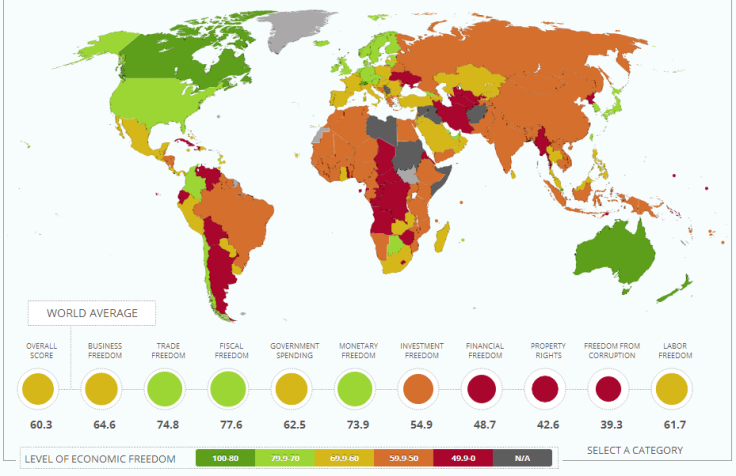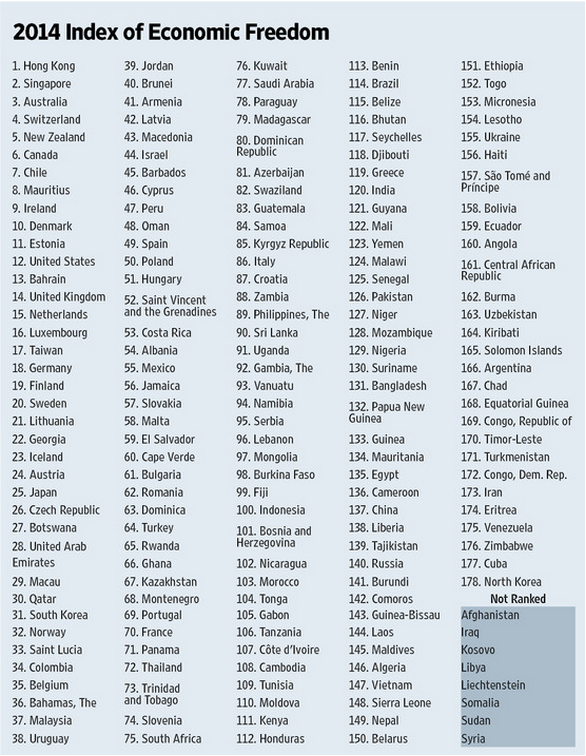America Just Got Bumped From This Top 10 List, And That's Really Depressing

World economic freedom has increased to record levels, according to the 2014 Index of Economic Freedom, released Tuesday by the conservative think tank Heritage Foundation and the Wall Street Journal. But the United States, after seven consecutive years of slipping down the index, has dropped out of the top 10 freest economies.
For 20 years, the Index of Economic Freedom has evaluated countries’ performances in 10 categories, including property rights, freedom from corruption, government spending, trade freedom and others. Scores from 0 to 100 are then averaged and the countries are classified as “free,” “mostly free,” “moderately free,” “mostly unfree” or “repressed.”
The “mostly free” United States sank to 12th place with an economic freedom score of 75.5, half a point lower than last year, when it ranked 10th.
The reason, according to editors of the report: "The overall economic policy direction of the United States in recent years has involved substantial growth in the size and scope of government, accelerating the erosion of economic freedom and contributing directly to America's fall from the top 10 freest economies.”
The editors also believe the absence of meaningful fiscal reform has weakened the U.S. government’s balance sheet and led to growth in government debt.
In addition, “The growth of government has been accompanied by increasing cronyism that has undermined the rule of law and the perception of fairness,” a report accompanying the index stated.
“It’s not hard to see why the U.S. is losing ground,” Terry Miller, director of the Center for International Trade and Economics at the Heritage Foundation, wrote in the Wall Street Journal opinion pages. “The Obama administration continues to shackle entire sectors of the economy with regulation, including health care, finance and energy. The intervention impedes both personal freedom and national prosperity.”
But globally, economic freedom is on the rise. The world average score is now 60.3, seven-tenths of a point above the 2013 average. Governments in 114 countries have taken steps in the past year to increase their citizens’ economic freedom, and 43 countries around world, including Sweden and Singapore, have reached their highest economic freedom ranking in the index’s history, according to Heritage.

Hong Kong is the undefeated champion of the Heritage/WSJ index, placing first for the 20th consecutive year and even improving its score from last year to 90.1. Improvements in labor freedom, government spending and fiscal freedom offset declines in freedom from corruption. The territory also has a transparent regulatory environment and a competitive tax regime, which contribute to a high score.
Singapore placed second, also for the 20th consecutive year. Australia held onto third place despite a slightly lower score this year, Switzerland passed New Zealand to place fourth, and Canada finished sixth, right behind New Zealand. Chile took seventh, and Mauritius, the only sub-Saharan country to rank among the top 10, placed eighth with a score of 76.5. Ireland re-entered the top 10 to finish ninth, just ahead of Denmark.
By region, Europe and North America average above the world in most areas of economic freedom, while South and Central America show mixed progress, the Middle East and North Africa are moderately free or mostly unfree, and sub-Saharan Africa has made great progress in recent years, but the majority of its economies are mostly unfree or repressed. Asia-Pacific dominates both the top and bottom of the rankings, with North Korea in last place.
The world’s most improved economy is Burma, with a 7.3 increase in score thanks to improvements in business, labor freedom and investment, though it remains a repressed economy, with a score of 46.5. The Central African Republic declined the most, by 3.7 points to 46.7.
Heritage estimates that 4.5 billion people, or about 65 percent of the world’s population, live in economically unfree countries. Twenty-seven countries have repressed economies with scores below 50, and only six have earned the “free” category with scores above 80.
“The strongly positive relationship between economic freedom and prosperity is apparent throughout the world,” the editors write. “In every region, per capita incomes are much higher in countries that are economically free.”
© Copyright IBTimes 2024. All rights reserved.






















